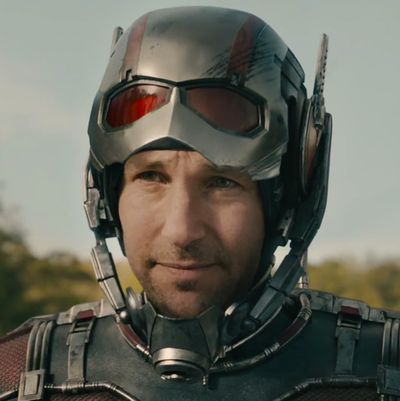
In a shared universe filled with superheroes, there are two kinds of great stories: main events and sideshows. A main event brings caped crusaders ever closer to a climactic threat, one that gravely imperils the world in which they crusade. A sideshow, on the other hand, doesn’t upend the shared universe — it dances around inside of it. The characters know the big heroes exist, but are not among their ranks. Sideshows are made by creators who revel in the quirks and contradictions of a shared universe, finding humor and tenderness in cheap apartments and D-list protagonists.
There’s a grand tradition of sideshows in comics history, but Ant-Man is the first sideshow of the Marvel Cinematic Universe (or MCU). The character and his story exist in the same world as the Avengers; that much the movie makes clear. But passing references notwithstanding, the two properties only intersect once, in a truly gratuitous scene: one that serves little to no narrative purpose, one that’s a shameless, transparent ploy to show off a more famous character. That scene is also one of the best in the movie, providing evidence that the Marvel movies might someday approach the convoluted joy of Marvel’s comics.
In case you haven’t already guessed, there are lots of spoilers here.
The scene in question is one in which Scott Lang — the titular ant-esque man — jaunts off to steal a device he needs in order to fight a bad guy. (The nature of the device is utterly beside the point.) It turns out the tech is stored in an Avengers base, and he suddenly finds himself face-to-tiny-face with Sam Wilson — the winged Avenger known as Falcon — who takes it upon himself to fight Scott off.
Their confrontation only lasts a few minutes, but is filled with charming bits. Scott, momentarily enlarged and tremendously nervous, tries various tactics to placate Sam. “I’m a big fan,” he says. Sam calmly demands that this intruder identify himself, and Scott puts on his best Batman voice and Iron Man smirk to reply, “I’m Ant-Man.”
This sentence, of course, means nothing to Sam — nor virtually anyone else in the MCU — but Scott doubles down on his futile, improvised bravado: “What, you haven’t heard of me?” He awkwardly tries to justify his code name (“I know, it’s not my idea!”) before Falcon gets fed up and the two have an inventively choreographed tussle. Scott successfully steals the MacGuffin and makes his escape, after which a humiliated Sam radios back to HQ and tells whomever’s on the line that absolutely no one is allowed to tell Captain America about this.
The brief, silly scene felt like something out of a charming sideshow comic — which is a rarity in the perpetually apocalyptic MCU. Rather than echoing Marvel epics like 1984’s Secret Wars or 1991’s The Infinity Gauntlet, it draws on the tone of Steve Gerber’s Howard the Duck stories of the late ‘70s or Ryan North’s delightful current run on The Unbeatable Squirrel Girl. Like those latter tales’ heroes, Scott is fully aware of the world in which he lives but isn’t used to playing any significant role in. He has merely watched as Iron Man, Thor, and the rest of the gang have both saved and changed planet Earth. He has no idea what to say to an Avenger when he meets one. In other words, Scott’s much more like an average MCU moviegoer than an MCU hero. (For insight on the origins of the scene, check out Kyle Buchanan’s interview with director Peyton Reed.)
There are other scattered moments in the movie that are archetypical sideshow bits. There’s the time when Scott’s mentor, Hank Pym, finishes a monologue about why the villain needs to be taken down; Scott pauses and says — quite rationally! — that they should proooobably just let the Avengers take care of it. Or consider the movie’s cold open, set in 1989, where a younger Pym curses out a bunch of S.H.I.E.L.D. bigwigs for trying to steal his research: It’s not a landmark moment for the MCU’s fictional history, but makes that world more interesting by showing how its learned elders can be total pricks. And, of course, there’s the pre-credits scene where we find out Falcon is interested in recruiting Scott — but only find that out thanks to a convoluted web of hearsay between various civilians, one of whom happens to have conversed with a de-costumed Falcon.
All of these moments remind us why a shared universe is worthwhile as a storytelling device, despite Avengers: Age of Ultron having made us doubt its viability by crowbarring in dozens of plot threads from previous and future story lines. In Ant-Man, the shared universe offers its creators a box of toys. It lets them take audience knowledge as a given, and then ask viewers to look at this fantasy world in new ways. It makes everything feel lived-in and filled with possibility. Ant-Man’s unnecessary tie-ins take a world of superhumans and make it feel surprisingly, charmingly human.

